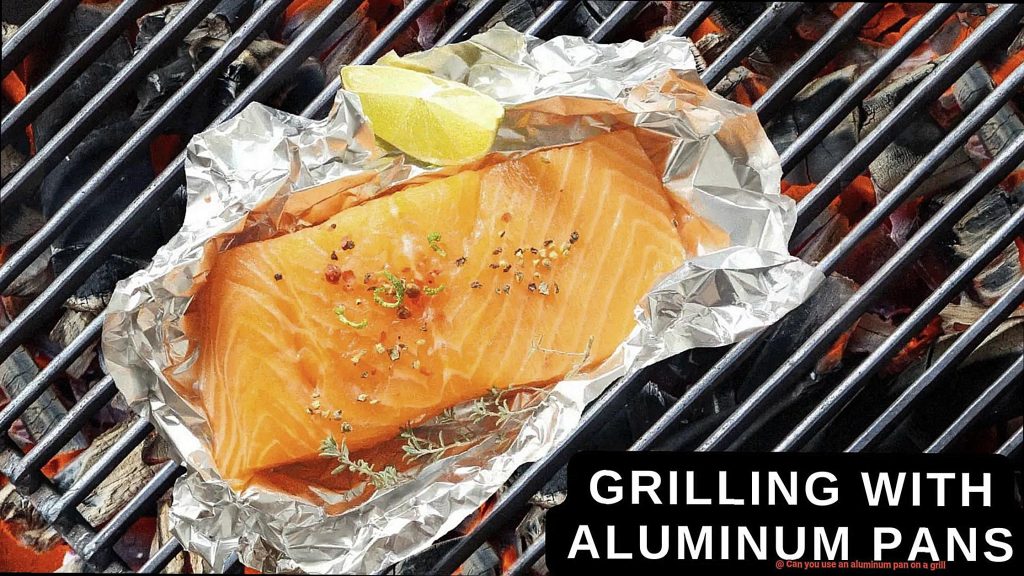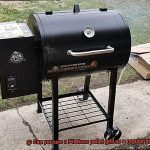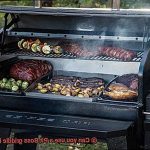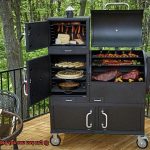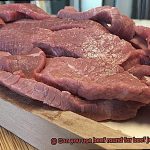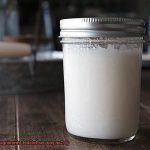Are you tired of the same old grilling routine and ready to take your BBQ game to the next level? Have you ever considered using an aluminum pan on your grill? Well, hold up before you get too excited. Let’s first answer the burning question: Can you use an aluminum pan on a grill safely?
While aluminum pans are great for baking and roasting in the oven, grilling requires a different set of rules. Using an aluminum pan on the grill can be tempting for its convenience, but is it worth risking your safety? In this blog post, we’ll explore whether or not it’s safe to use an aluminum pan on a grill and share some tips for doing so.
We’ll also weigh the pros and cons of using aluminum pans on the grill so that you can make an informed decision. Plus, we’ve got some mouth-watering recipes that will have your taste buds dancing with joy. From grilled seafood to veggies, these recipes will help you become a master chef in no time.
So, grab your apron and let’s get cooking. With our help, you’ll be able to impress your friends and family with delicious dishes made using aluminum pans on the grill. Let’s dive in and discover everything you need to know about using an aluminum pan on a grill.
Contents
Benefits of Using an Aluminum Pan on the Grill
Using an aluminum pan on the grill might just be the solution you’ve been searching for. Not only does it make grilling easier and more convenient, but it also offers a host of other benefits that every griller should know about.
Firstly, using an aluminum pan on the grill can help prevent flare-ups. This simple yet effective tool acts as a barrier between the food and the flames, reducing the risk of grease and oil dripping onto the hot coals and causing flames to shoot up. Say goodbye to burnt burgers and singed steaks with this simple trick.
In addition, using an aluminum pan can help keep your grill clean. By placing your food in a pan instead of directly on the grates, you can avoid any food particles or marinades from sticking to the grill and becoming difficult to clean later on. Plus, cleaning a pan is much easier than trying to scrub down a grill grate. Keep your grill in top condition with this hassle-free method.
But that’s not all – using an aluminum pan on the grill also allows for more versatile cooking options. You can use it to cook delicate or small items like fish or vegetables that might otherwise fall through the grates. This opens up a whole new world of culinary possibilities.
You can also use it for indirect cooking, which involves placing the pan on one side of the grill while the coals are on the other side. This creates a more even heat distribution and allows for slower, more controlled cooking. Say goodbye to overcooked or undercooked dishes with this foolproof method.
Furthermore, using an aluminum pan on the grill can help make cooking large quantities of food easier. For example, if you’re hosting a party or a large family gathering, you can use multiple pans to cook different items at once without overcrowding the grill.
No more juggling multiple dishes and burning out your grill. Plus, aluminum pans are affordable and widely available, making them a practical choice for any griller looking to enhance their grilling experience.
Choosing the Right Type of Aluminum Pan for Grilling
Choosing the right type of aluminum pan for grilling can make all the difference in achieving perfectly cooked and safe food. Here are some crucial factors to consider when making your purchase:
- Thickness: The thickness of the pan is crucial when it comes to grilling. A thicker aluminum pan will distribute heat more evenly, preventing hot spots that can cause food to cook unevenly or burn. Opt for a thicker pan rather than a cheaper, thinner option that may warp or buckle under high heat, potentially causing spills or uneven cooking.
- Size: Consider the size of your grill when selecting a pan. Choose a pan that fits comfortably on your grill without overlapping or spilling over. A pan that is too small may not hold all your food, while a pan that is too large may not fit properly on your grill and could cause heat loss.
- Coating: Pay attention to the type of coating on the aluminum pan. Some pans come with non-stick coatings that can handle high temperatures and prevent food from sticking. However, these coatings may not be suitable for all types of grilling and can wear off over time. Other pans may have a natural finish that requires seasoning before use to prevent sticking.
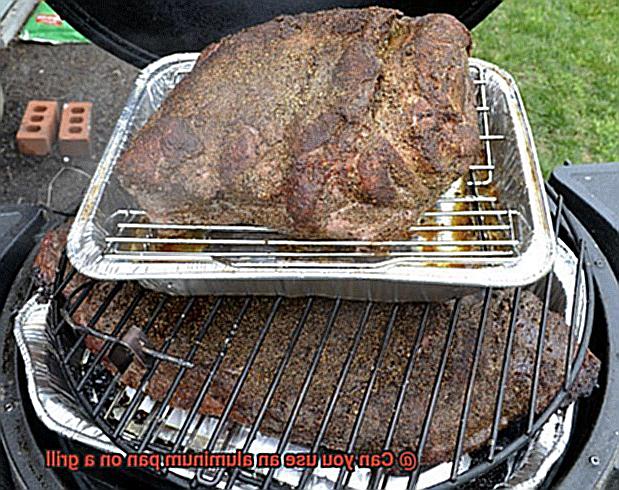
Avoiding the Use of Foil as a Makeshift Grill Pan
It’s important to take precautions to ensure that our food is cooked safely and healthily. One common mistake that many of us make is using aluminum foil as a makeshift grill pan. But did you know that this could potentially be harmful to your health? Let’s dive into why you should avoid using aluminum foil on your grill.
To start, let’s talk about the potential health risks associated with cooking with aluminum foil. When heated, aluminum foil can release harmful chemicals and toxins that are dangerous if ingested over time. Prolonged exposure to aluminum has been linked to bone disorders, kidney problems, and even dementia, according to the World Health Organization (WHO). While cooking with aluminum foil on a grill may not necessarily cause these problems, it’s always better to err on the side of caution.
But that’s not all – using aluminum foil as a makeshift grill pan can also be a fire hazard. If the foil is not properly secured or if it tears easily, your food can fall through the gaps and onto the flames below. This can not only ruin your meal but also start a fire. So, why put yourself and your loved ones in danger?
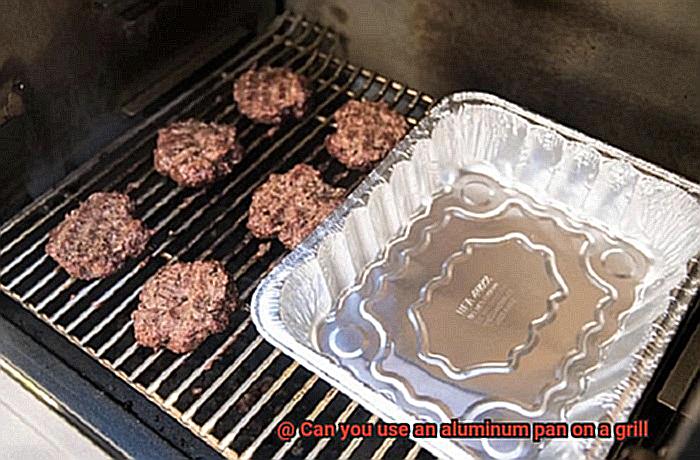
Fortunately, there are safe alternatives to using aluminum foil on your grill. One option is to use a cast-iron skillet or griddle that can withstand high temperatures and provide a sturdy surface for cooking delicate items. Cast-iron is ideal for searing and browning meats or vegetables while retaining their natural flavors and juices. Another option is to use stainless steel or porcelain-coated grates that come with some grills. These grates are non-stick, easy to clean, and allow you to cook delicate foods without the need for aluminum foil.
Placing the Aluminum Pan Directly on the Grates
Grilling is a beloved pastime for many, and using aluminum pans can make the process even more convenient. However, before you place that aluminum pan directly on the grates of your grill, there are a few important considerations to keep in mind.
First and foremost, it’s crucial to choose a high-quality aluminum pan that is specifically designed for use on a grill. Flimsy or cheap pans can melt or warp when exposed to high heat, posing both safety risks and potential damage to your grill.
Additionally, when selecting your pan, it’s essential to consider its size and shape. Ensuring that it fits securely on the grates without tipping or wobbling will prevent spills and guarantee even cooking.
While using an aluminum pan can be a great way to cook certain foods, monitoring the grill temperature closely is essential. Because aluminum conducts heat more quickly than other materials, your food may cook faster than expected. Keeping a watchful eye will help you avoid overcooked or burnt food.
It’s also worth noting that using an aluminum pan directly on the grates can limit airflow around your food. This can affect the flavor and texture of your food, particularly if you’re aiming for a crispy or charred exterior. Consider using a cast-iron skillet or stainless steel grate instead if this is a concern.
Preheating the Aluminum Pan Before Adding Food
Preheating is an essential step that ensures your food cooks evenly and thoroughly, while also giving you those beautiful grill marks we all love.
To preheat your aluminum pan correctly, place it on the grill for at least 5-10 minutes before adding any food. This allows the pan to heat up to the same temperature as the grill grates. You can test if your pan is ready by sprinkling a few drops of water onto it – if they sizzle and evaporate quickly, then your pan is hot enough.
It’s crucial not to add oil or butter to the pan until it has been preheated. Adding oil too soon can cause it to smoke and burn, ruining the flavor of your food. Instead, wait until the pan is hot enough before adding a small amount of oil or butter.
Once you’ve added your oil or butter, wait a few seconds before adding your food. This allows the oil or butter to heat up and create a non-stick surface on the pan. When adding food, be careful not to overcrowd the pan. Overcrowding can cause your food to steam instead of sear, leading to soggy and unappetizing dishes.
In summary, here are some key takeaways for preheating your aluminum pan:
- Place the pan on the grill for at least 5-10 minutes before adding any food.
- Test if it’s ready by sprinkling water on it – if it sizzles and evaporates quickly, then your pan is ready.
- Only add oil or butter once the pan is hot enough.
- Wait a few seconds after adding oil or butter before adding food.
- Avoid overcrowding the pan.
Tips for Ensuring Even Cooking and Preventing Sticking
Grilling with an aluminum pan is a great way to cook your favorite foods, but ensuring even cooking and preventing sticking can be a challenge. However, with the right techniques, you can achieve a delicious and successful grilling experience. Here are five tips to help you grill like a pro:
Choose the Right Pan
To ensure even cooking, look for a heavy-duty aluminum pan with a non-stick coating. This will prevent food from sticking and ensure that heat is distributed evenly throughout the pan.
Preheat the Pan
Before placing your food in the pan, preheat it on the grill for a few minutes. This will help prevent sticking and ensure that your food cooks evenly. You can also add a small amount of oil or cooking spray to the pan for an extra layer of protection against sticking.
Avoid Overcrowding
When cooking in the pan, try not to overcrowd it. This can lead to uneven cooking and prevent the food from getting crispy. Instead, cook in batches or use multiple pans if necessary. Make sure to flip your food regularly to ensure even cooking on both sides.
Let Meat Reach Room Temperature
If you’re cooking meat in the aluminum pan, make sure to let it reach room temperature before placing it on the grill. This will help prevent sticking and ensure that the meat cooks evenly. It’s also important to let your meat rest after cooking to allow the juices to redistribute for a more flavorful and tender result.
Use a Lid
A lid on the grill can help trap heat and create a more consistent cooking environment for the food in the aluminum pan. This can also help speed up cooking time and prevent food from drying out.
Cleaning and Maintaining Your Aluminum Grill Pan
Grilling is not just a cooking method; it’s a way of life. And if you’re a grilling enthusiast, you know that your aluminum grill pan is a prized possession. It’s lightweight, durable, and the perfect tool for cooking up delicious grilled meals. However, much like any other grilling equipment, your pan requires proper cleaning and maintenance to ensure longevity and safe usage. In this article, we’ll discuss how to clean and maintain your aluminum grill pan like a pro.
Step 1: Clean Your Pan After Every Use
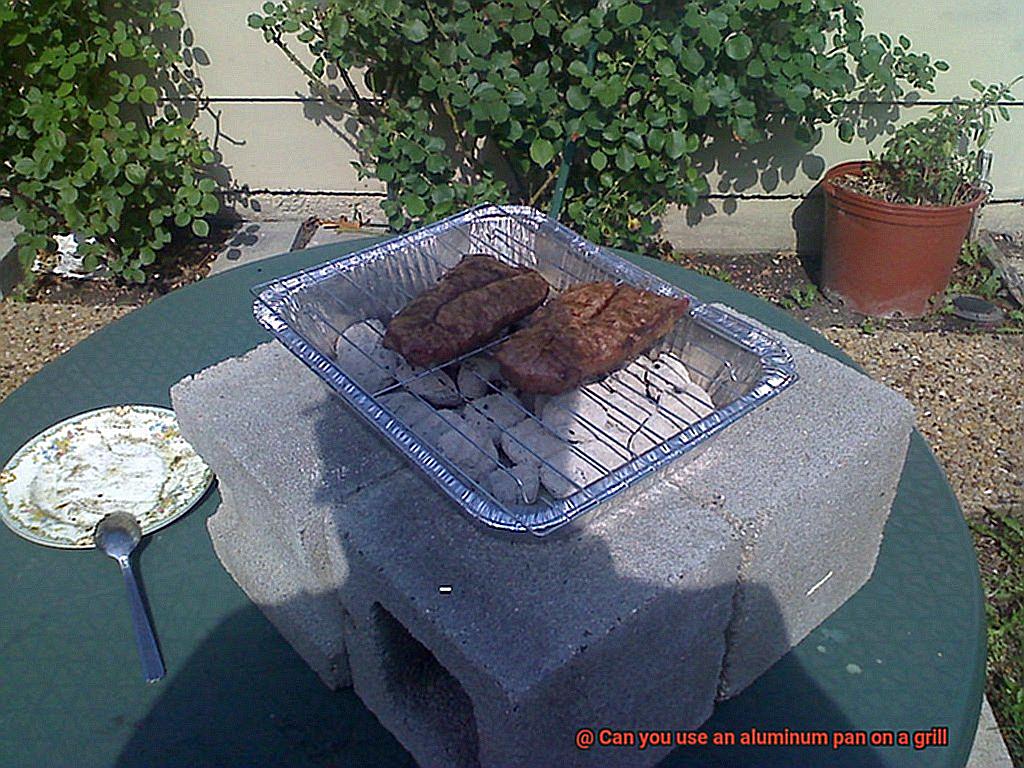
Cleaning your aluminum grill pan after every use is crucial to prevent the buildup of grease and food debris. It also helps to maintain the flavor of your food and prevents contamination. To clean your pan, use warm soapy water with a soft-bristled brush or sponge. Make sure to scrub all sides of the pan thoroughly to remove any stuck-on food.
Step 2: Avoid Using Harsh Chemicals
While cleaning your pan, it’s important to avoid using harsh chemicals like bleach and ammonia. These chemicals can damage the surface of your grill pan, leading to discoloration or even rust and corrosion. Instead, use mild dish soap and water or a specialized aluminum cleaner to clean the pan. This will remove any stains or discoloration without damaging the pan’s surface.
Step 3: Avoid Using Abrasive Scrubbers
Abrasive scrubbers like steel wool may seem like a good idea to remove stubborn stains, but they can scratch the surface of your aluminum grill pan. Scratches can make it more prone to rust and corrosion, which can shorten its lifespan. Instead, use a soft-bristled brush or sponge to prevent damage.
Step 4: Dry Your Pan After Cleaning
After cleaning your aluminum grill pan, make sure it’s completely dry before storing it away. Moisture can cause rust and corrosion, which can lead to a shorter lifespan for your pan. To ensure it’s dry, wipe it with a clean towel or let it air dry for a few minutes before storing.
Step 5: Store Your Pan Properly
Proper storage is essential for the longevity of your aluminum grill pan. Keep it in a dry and cool place to prevent moisture buildup. Additionally, store it away from other metals to prevent galvanic corrosion. A great way to store your pan is to hang it on a hook or stack it with other pans.
kKy5PsEZj_s” >
Conclusion
In conclusion, incorporating an aluminum pan into your grilling routine can revolutionize your BBQ experience. The convenience and versatility it offers make it a must-have tool for any grill master. Moreover, it can even enhance the flavor of your food while keeping you safe.
However, selecting the right type of aluminum pan is crucial to ensure that your food is cooked to perfection and free from harmful chemicals. When purchasing an aluminum pan, consider factors such as thickness, size, and coating. Avoid using aluminum foil as a makeshift grill pan as it could be a potential fire hazard.
To achieve evenly cooked and non-stick results, opt for a heavy-duty aluminum pan with a non-stick coating and preheat it before placing food on it. Overcrowding the pan should be avoided, and letting meat reach room temperature before grilling is recommended. Using a lid on the grill can also help trap heat and create an ideal cooking environment.
Properly cleaning and maintaining your aluminum grill pan is essential for its longevity. After every use, clean your pan with warm soapy water or specialized aluminum cleaner without using harsh chemicals or abrasive scrubbers. Thoroughly dry your pan before storing it in a cool and dry place away from other metals.
Overall, incorporating an aluminum pan into your grilling routine can lead to mouth-watering dishes with ease.

